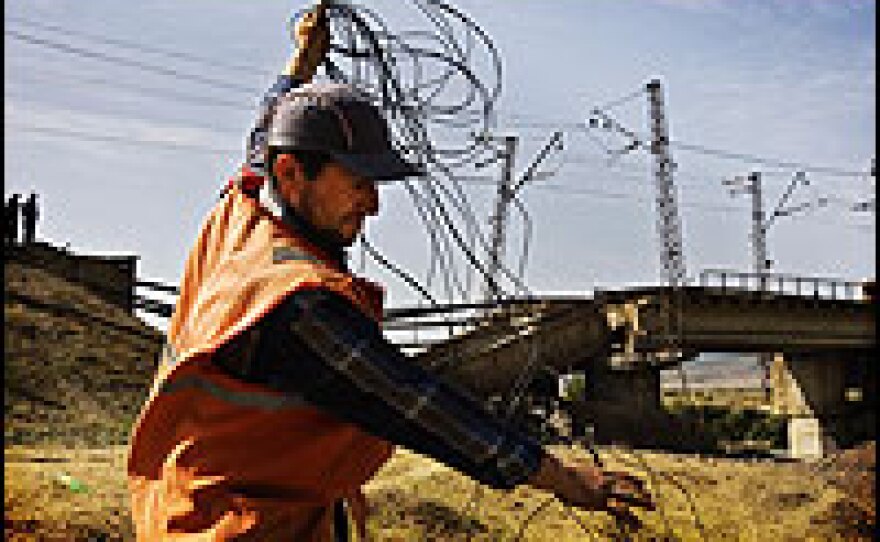
The short war between Russia and Georgia has not only threatened to rupture relations between Moscow and the West, it has also threatened plans to further develop an energy corridor through Georgia and the Caucasus region.
That corridor would deliver oil and natural gas from the resource-rich Caspian Sea to markets in the West.
Blasts Destroy Export Routes
On Monday, Georgian firefighters battled a huge blaze after a train exploded on Georgia's main east-west railroad.
The blast hit a fuel car from neighboring Azerbaijan, sending a pillar of smoke and fire into the air. Normally, the railroad can carry up to 70,000 barrels of oil a day to tanker ships ready to export the oil from the Black Sea.
Georgian officials accused Russia of mining the train tracks. And Georgians had also accused Moscow of another mysterious explosion, which destroyed a key bridge on the same railroad line more than a week ago.
Russian generals, whose troops continue to occupy Georgian territory not far from the sabotaged railroad, have denied the accusations.
A Corridor With Billions Of Dollars Of Investment
The incident sent chills down the spines of energy companies and oil producers who have invested years of diplomacy and billions of dollars into developing an alternative energy corridor through Georgia.
That corridor would transport oil and gas from the land-locked Caspian Sea to the West.
John Roberts, a specialist at the energy news agency, Platts, says 1.5 percent of traded world oil supplies travel through Georgia.
"Georgia was increasingly likely — or was before the war — likely, to become a major corridor for gas going from Central Asia to European markets."
The railroad is the smallest of several transit systems that snake across Georgia, transporting millions of dollars worth of oil and natural gas a day.
European Reliance On Russian Energy
In addition to the railroad, all three of Georgia's energy pipelines were shut down during the short Russo-Georgian War. The European Union's envoy to the Caucasus, Peter Semneby, says the conflict has threatened Europe's energy supplies.
"What happens here affects the fundamental security interests of the EU, not least energy interests, energy security," Semneby says. "It also affects obviously the quality of our relationship with Russia."
Russia is a major energy producer in its own right, supplying 25 percent of Europe's natural gas. Russia also controls most of the pipelines that run from the former Soviet republics around the Caspian Sea to Europe.
In recent years, the Kremlin has demonstrated its monopolistic might, by shutting off energy supplies during disputes with smaller neighbors like Lithuania, the Czech Republic, Ukraine and Georgia.
Sean Roberts, is an associate professor at George Washington University's Elliot School of International Affairs, says Russia dominates all of the transport routes and basically dictates terms of transport.
"The U.S. and several EU countries have been pushing for quite some time to have routes for oil and gas that would circumvent Russian territory," Roberts says. "The Russians saw this as a direct threat to their interests."
Pipelines That Circumvent Russian Territory
Two years ago, a consortium led by the oil giant BP began pumping oil down a new $4 billion pipeline, which runs for nearly a thousand miles — from Azerbaijan through Georgia to a Mediterranean Sea port in Turkey. Washington has been lobbying hard to convince large energy producers on the Caspian Sea, like Kazakhstan and Turkmenistan, to link to the pipeline.
But energy analysts say the sight of hundreds of Russian tanks rumbling unimpeded across Georgian territory, has done irreparable damage to Western plans to expand this alternate energy corridor. And they say Russia's show of force has strengthened Moscow's hand in the international scramble for access to oil and gas in the former Soviet republics.
Copyright 2022 NPR. To see more, visit https://www.npr.org. 9(MDAzMjM2NDYzMDEyMzc1Njk5NjAxNzY3OQ001))







